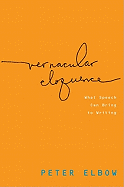
The passage of No Child Left Behind in 2002 was meant to improve American public school students' chops in several core subjects. A decade later, many experts doubt this or any other reforms have succeeded in teaching kids to write. Some insist that our children aren't learning to write at all--or worse are writing "onli in txt msgs lol."
In Vernacular Eloquence, Peter Elbow notes that the reason many people don't write is because writing scares them. Schools teach writing as if it's hard, and turn it into a high-stakes endeavor. "Everybody knows" writing is harder than speaking, often precisely because it's not speaking; it's communication in a language nobody actually uses in daily life. It doesn't have to be this way, though: Elbow argues that much of what is good in speech--its directness, its clarity, its "flow"--can be applied to writing.
Vernacular Eloquence spends its time equally between building Elbow's arguments as to why the best parts of speech can and should be harnessed for writing and explaining how teachers, parents and students can do so. Elbow bases both sections on his experience as a professor of English at the University of Massachusetts at Amherst, teaching writing to students who often arrived with a fear that they couldn't put pen to paper effectively--even though they could speak eloquently.
By encouraging students to "speak onto the page," we can escape the fear of writing and the stilted voice that fear creates. --Dani Alexis Ryskamp, blogger at The Literary Cricket

